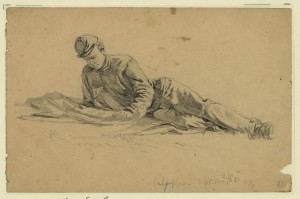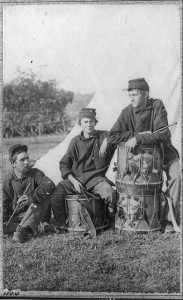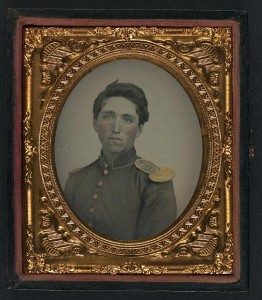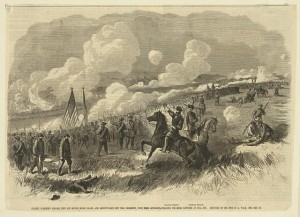A hot day in June. What a great time to get out of your tent and walk to the shade and relative coolness of a peaceful woods in the District of Columbia (?) and write a long letter home.
From The Courier, Seneca County, New York newspaper June 27, 1861:
LETTERS FROM VOLUNTEERS
FROM THE 19th REGIMENT.
CAMP CAYUGA, CALARAMA HEIGHTS,
NEAR WASHINGTON, JUNE 24, 1861
FRIEND FULLER:- The weather being excessively warm, I have just left my tent, and sought shade-trees of the woods, under whose branches I can count some thirty or forty seated upon the ground to write, like myself, with books, boards, sticks of wood, and almost everything else with a flat side to it, for a table. This has been my first “living in the woods,” and I think it a decidedly healthy as well as romantic life – for here we breathe nature’s atmosphere pure from the verdant forests around us, and drink the cool, wholesome water just as it runs from the surrounding banks. In fact, we possess the best camping-ground in the District, and the novelty of it, compared with “city-life,” makes it worthy of putting up with its disadvantages and hardships. Six from each company are allowed a “pass” each day to go to Washington, but there is little disposition to exhibit our very nice (?) clothes, for fear of captivating some of the city belles, and there is also great danger of our being captured as escaped convicts, or being laughed at for wearing “the old man’s breeches.” If the Government ever sends us home in this plight, we hope, like strangers, to be “taken in” but not in the style that the clothes and the contractors have done.
We are daily visited by public benefactors, in the shape of negroes and poor white men, (Jeff D. thinks the former the most consequence, but will change his mind ere long,) who sell us lemonade at 5 cents a glass, sour and musty pies at 20 cents a piece, bellona sausages for 25 cents, crackers one cent a piece and other luxuries in proportion. The little negro boys and girls pay us visits daily, going through lots of funny performances, such as singing “Dixie’s Land,” and other songs, dancing, running races, jumping, turning somersets (the boys I mean) and various other ludicrous manoevers.
The 26th Philadelphia Regiment is encamped close by us. It has a splendid brass band, which serenaded us night before last, winding up with the “Star Spangled Banner” and “Yankee Doodle.” As our Regiment does not possess a brass band, it was duly appreciated and cheered. We had a visit from President Lincoln last Sunday, and the boys, one after another, walked up and shook hands with him, keeping both of Honest Abe’s hands in good exercise for some time. Some of the “shortys” of our Regiment looked of little consequence before him, but he paid just as much attention to them as to the tallest. He looks healthy, rugged, and, notwithstanding the pressure of circumstances, in good spirits.
There has some unusual excitement prevailed in camp caused by a rumor that Gen. Beauregard’s forces were on their march toward Washington, and were going to attack us night before last. It was not generally believed that he would be so foolish to attempt it, but the troops did not know what the rebels, maddened by defeat and despondency might do to revive their spirits. Accordingly, those on the Virginia side slept on their arms, and a good many of our boys slept with “one eye open.” It is not believed that Gen. Beauregard’s forces between here and Culpepper Court House amounts to more than 20,000, and these poorly armed and disciplined, while there are nearly double that number well armed within two hours’ call of Gen. Scott.
The average number of passenger cars arriving daily is about 200.- The Second RI Regiment arrived last night occupied fifty cars.
The disunionists under Beauregard, encamped about Germantown and Fairfax Courthouse, it is reliably stated, number quite ten thousand strong. Provisions for the past three days have been very scarce among them, and his soldiers are swearing terribly about their poor usage, and because Gen. McDowell does not attack them, and Beauregard won’t attack him. The Thirty-first Regiment (Col. Pratt,) and the Thirty-seventh (Col. McGunn) arrived here last night. The Eighteenth N.Y. Regiment went into camp on Friday night, in the direction of Arlington. The Twelfth N.Y. Regiment was sent over to the Virginia side the same night, for the purpose of guarding the immediate approaches of the Long Bridge. They returned to their quarters yesterday morning.
There are but 150 cases of sickness at Georgetown military hospital, which is very few considering the great amount of troops stationed in the vicinity. None are seriously ill in Capt. Ashcroft’s Company, though a few are troubled with diarrhoea and slight colds. Our boys stand it as well as any in the regiment. Some complaint is made in other Companies, and not without good cause, of the incompetency of officers. We hear of nothing of the kind in our Company, for we have undoubtedly the most efficient commissioned officers in the Regiment. We are getting tired of inactivity, and want to see an engagement to ascertain what we are made of. If we do not have some action before the three months expire, there will few of see any, as not a very many of our Regiment will be apt to take the oath for three years – not that they are not as patriotic and brave as ever, but they think that three years is rather too long, considering the impositions already practiced upon them by unscrupulous speculators. If some of us could get hold of some of these rascals, they would stand as poor a chance as Jeff Davis or Beauregard.
Yours truly,
O W Langford
According to the Muster Roll in Cayuga in the Field an Oscar Langford did serve as a private in Captain Ashcroft’s Company C in the 19th NY Volunteer Infantry.
I know I’m doing what Arkansas Senator Robert Ward Johnson warned about by singing psalms to dead horses, but the shabby gray uniforms of the 19th and other New York regiments keeps coming up again and again. I thought of the Cat Stevens song when I first read this letter. Mr. Langford is using sarcasm, but I can see how these soldiers far from home would want to use their pass to go to Washington and meet some women – but they’re kind of embarrassed to parade their uniforms that are falling off in front of the belles of D.C. (how many movies have I seen where troops in their shiny uniforms hit the town for some fun?) It is interesting that it seems that Langford is using the shoddy treatment as a possible excuse for not serving beyond the three-month commitment.
… was Rhode Island’s fighting regiment. It fired the opening volley at First Bull Run, and was in line at the final scenes of Appomattox. It arrived at Washington, June 22, 1861, and after a few weeks encampment there, marched to the field of First Bull Run. It was then in Burnside’s Brigade, of Hunter’s Division. Burnside opened that fight with the First Rhode Island deployed as skirmishers, and the Second advancing in line of battle. Its casualties in that engagement aggregated 98 in killed, wounded and missing; among the killed were Colonel Slocum, Major Sullivan Ballou, and two captains.
Pennsylvania Volunteers of the Civil War lists the many engagements in which the 26th Infantry Regiment participated. Of the 222 deaths in the regiment almost exactly two-thirds were from combat, one-third from disease. I found out that the 26th PA had a Medal of Honor recipient – George W. Roosevelt, who was cited for his courage at 2nd Bull Run and Gettysburg. You can see a photo and read more about him at Home of Heroes. It is said he was a cousin of the Roosevelt presidents.





Pingback: Hot Night Jammed in a Freight Car | Blue Gray Review